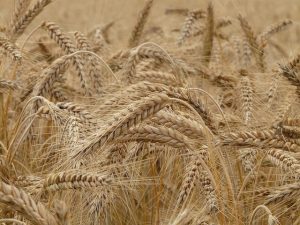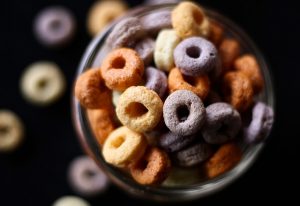
Remember the days when you could just eat whatever, whenever and you’d get away with it? No stomach discomfort, no bloating, no brain fog, no issues whatsoever.
You’d eat your sugary cereal for breakfast, your frozen pizza for lunch and finish every day with a healthy serving of ice cream and a bag of chips. Digesting and assimilating every crumb effortlessly.
Today, however you can’t even look at bread without getting bloated and the mere thought of an ice cream milkshake will have you running to the nearest bathroom. But it’s not just you. You get the feeling that everybody is intolerant to everything these days. Elimination diets are quickly becoming the new standard, as supermarkets are bursting with gluten-free, dairy-free, lactose-free, fructose-free, sugar-free options.
Why is that?
Before you go over my theories, know this: I am not a doctor and the following information is not intended to substitute medical advice. Also understand that I’m talking about food sensitivities and intolerances, not allergies. If you’re one of the few individuals suffering from a serious food allergy, the following might only be of entertainment value to you. For everyone else, get your cookie dough ice cream (full gluten and lactose) ready and enjoy the ride.
“Gluten is the reason you’re fat and sick”

Gluten is a complex of proteins found in wheat and related grains. It’s responsible for giving breads and cakes a chewy and doughy texture.
While the anti-gluten movement claims that wheat and other gluten containing grains have been industrially hybridized and molded into this modern menace, unfit for human consumption, there’s no evidence to support those ideas.
Some “experts” go so far as to say that wheat is the root cause of obesity and metabolic syndrome in the industrialized world. The truth behind all this pseudo-science will have you shaking your head in disbelief.
When you start looking behind the marketing, behind the righteous “scientifically proven” claims, you realize most of it (if not all) is misunderstood or misinterpreted information, blended into a sellable cocktail for the well-meaning consumer (= you).
Who’s the bad guy?
Grains have been part of the human diet for thousands of years. Cereal grains such as rice and wheat, as well as legumes such as beans and peas represented a major food source throughout history. Originally cultivated in the Near East, wheat supplies up to 20% of calories consumed around the world today (Cummins/ Roberts-Thomson, 2009).
During the last few decades, we’ve witnessed a substantial increase in per capita grain consumption. It is also in this timeframe that we’ve seen the numbers of digestive disorders, food intolerances and allergies explode. Is there a link?
Despite the mass hysteria regarding grains and gluten, less than 1% of the (European and American) population is suffering from celiac diesease (Mustalahti et al, 2010) and an estimated 0.5-13% suffer from gluten sensitivity (Molina-Infante et al, 2015). Non-celiac gluten sensitivity (NCGS) may cause digestive symptoms, as well non digestive symptoms such as chronic fatigue, allergies and neurological ailments, among others.
Once your digestion is compromised, grains and dairy products are usually the first to cause adverse reactions. Up to 50% of people diagnosed with celiac disease are also sensitive to milk (Kristijansson et al, 2007). Casein, a protein found in milk, seems to be particularly problematic. (Lactose intolerance is even more prevalent, with upwards of 70% of the global population diplaying a lactase deficiency, the enzyme responsible for breaking down milk sugar)
It’s always either a ‘too much’ or a ‘too little’
So what’s causing the issue? Wheat? Sugar? Carbs or fat? What about dairy and animal products?
Here’s your answer: Too much fat, too much sugar, TOO MANY CALORIES.
Don’t look to demonize particuar foods or macronutrients. The chronic energy imbalance rampant in our society is the culprit. We eat too much and move too little.
Your diet and lifestyle choices have brought you here. And looking at isolated elements (i.e. single food items) will only leave you with more question marks and insecurities. Wheat is not why you’re always tired after eating. It’s not the cause of your stomach’s uproar post meal. It’s also not responsible for your excess pounds. And no, it’s not the drop of milk you add to your morning coffee, either.
It’s the fact that you’ve been eating too much (and too much of the wrong food) since you started making your own food choices.
Never giving your body a break. Never letting your digestive, endocrine and immune systems recover. Never saying no to that extra serving of dessert, that extra bag of chips and the mandatory cans of soda. And sure as shit never saying yes to your buddy who tried to persuade you to hit the gym or go for a morning run.
Don’t misunderstand me. I’m in no way trying to downplay the current situation. We are undoubtetly facing a global phenomenon of unprecedented magnitude. But we’re barking up the wrong tree.
“But I’m eating healthy and still can’t tolerate wheat/gluten/grains etc.”
Gluten-free has become a multi-billion dollar industry. You can now find “gluten-free” or “GF” stickers on a variety of foods, cosmetics and health products. People today avoid gluten like the plague, even if they don’t suspect an intolerance, as they believe gluten-free to be the healthier option. But that’s not necessarily the case.
Replacing processed junk with supposedly healthy junk won’t help you in any way. A diet high in refined carbohydrates, inflammatory oils and artificial ingredients is the reason your digestion is out of order. And a fancy label or sticker isn’t going to change that.
Gluten-free foods are often more refined and convert to glucose faster than traditional gluten-containing foods. This is the last thing you want, as chronically elevated blood sugar levels damage your intestinal wall, promoting gut permeability (“leaky gut”) and disrupting immune function. Adding to that, high glucose levels deplete your body’s mineral reserves. Once you reach low micronutrient status (a common theme), your digestive and endocrine systems become heavily compromised.
If you’re going to scratch gluten from your diet, make sure to replace it with real food, not with junk masquerading as health food. Gluten-free breads, cereal and cookies are not the answer and will only serve to exacerbate the issue.
“Should I eat a low carb diet?”
Carbohydrates are an essential part of the human diet. Don’t let anyone tell you any different. The amount you consume and the individual context matters. The general consensus is, the more physically active you are, the more carbohydrates your body will be able to tolerate.
 However, just because you can get away with eating Fruit Loops 3 times a day with no apparent adverse effects (there are adverse effects, trust me), doesn’t mean it’s a good idea.
However, just because you can get away with eating Fruit Loops 3 times a day with no apparent adverse effects (there are adverse effects, trust me), doesn’t mean it’s a good idea.
On the other hand, eating a low carbohydrate (i.e. paleo, Atkins) diet is not a viable long-term solution either. It can work (very well actually) for weight-loss and lowering systemic inflammation associated with a western diet. But once you reach a healthy bodyweight, you will start running into problems keeping carbs chronically low.
Food intolerances, insulin resistance and gut dysbiosis (proliferation of bad bacteria) go hand in hand. And there’s one universal solution: Eat nutrient dense, minimally processed foods, in the right amounts for you. There’s no need to cut out entire food groups or macronutrients.
Fight back: Repair your digestion in 4 steps
Now that you know the real reason behind your gut issues, let me show you what I did to rid myself of (clinically diagnosed) food intolerances and bulletproof my digestion. Worked for me, will work for you.
# 1
Minimize consumption of highly refined, nutritient poor foods. Eat from the lean and mean buffet and stop falling prey to heavily marketed products and diets. The companies pushing these products don’t give a shit about you or your health. But I do.
Aim to lower systemic inflammation by emphasizing omega-3 rich foods in your diet. If you’re eating the average western chow, your omega-3 intake is hopelessly low. Instead of popping fish oil pills, I want you to start consuming fatty fish and marine foods on a regular basis (at least 2x/week) while lowering the intake of refined vegetable oils (soybean, saff-, sunflower, rapeseed oil) as they adversely impact your lipid balance.
# 2
If you suspect a food intolerance, try eliminating the offender(s) for a few weeks and see if that helps. You don’t have to permanently avoid wheat, dairy, and other foods, though. That will inevitably limit the nutrient diversity and sustainability of your diet, as you’ll likely end up eating the same foods day in day out.
Your goal is to condition your body to process most foods without side-effects, not to avoid or eliminate foods for the rest of your life.
# 3
Reducing the amount of food (calorie restriction) is perhaps the most powerful health tool known to man. Taking in less calories than your body expends for a couple weeks alone, will be sufficent to improve insulin sensitivity and restore digestive integrity. No need for a juice cleanse. Instead, cut out snacking throughout the day and reduce the portion size at your main meals. If you’re overweight, losing the spare tire will work wonders for your digestion.
# 4
And lastly, consider getting a comprehensive blood panel done. Addressing micronutrient deficiencies will benefit your digestion more than eating clean or healthy ever could. Especially if you find yourself in a position where nothing else seems to help. Make sure your Vitamin D, Magnesium, Zinc and Iron levels are adequate (ask your doc for these tests specifically!). Don’t make the mistake of thinking you have all bases covered because you eat the occasional carrot.
How to bulletproof your digestion:
- Eliminate junk food from your diet
- Introduce days of undereating (deficit days)
- Lose the excess weight
- Support your gut microbiome by maximizing nutrient density
- Address micronutrient deficiencies (!!)
Now it’s on you. Stop paying attention to the media buzz and start taking matters into your own hands. If you think this is too simple a solution, you’re mistaken. Your body is subject to the most primal laws of nature. Bad luck and bad genetics don’t exist. You were born with all the right tools to get the job done.
I encourage you to check out the links I provided throughout this article for additional information. If there’s anything else you want to know, leave a comment or ask me directly.
Thank you for reading
Victor
Resources
Bailey, R.L., West, K.P. Jr, Black, R.E. (2015). The epidemiology of global micronutrient deficiencies. Ann Nutr Metab. 2015;66 Suppl 2:22-33.
Brown, K., DeCoffe, D., Molcan, E., & Gibson, D. L. (2012). Diet-Induced Dysbiosis of the Intestinal Microbiota and the Effects on Immunity and Disease.Nutrients, 4(8), 1095–1119.
Fred J.P.H. Brouns, Vincent J. van Buul , Peter R. Shewry (2013). Does wheat make us fat and sick? Journal of Cereal Science; 58 (2013): 209-215
Cummins, A.G., Roberts-Thomson, I.C. (2009). Prevalence of celiac disease in the asia–pacific region. Journal of Gastroenterology and Hepatology, 24 (2009), 1347–1351
M. Hession , C. Rolland , U. Kulkarni , A. Wise and J. Broom (2009). Systematic review of randomized controlled trials of low-carbohydrate vs. low-fat/low-calorie diets in the management of obesity and its comorbidities. Obes Rev. 2009 Jan;10(1):36-50
Ludvigsson, J.F., Leffler, D.A., Bai, J.C., Biagi, F., Fasano, A., Green, P.H., Hadjivassiliou, M., Kaukinen, K., Kelly, C.P., Leonard, J.N., Lundin, K.E., Murray, J.A., Sanders, D.S., Walker, M.M., Zingone, F., Ciacci, C. (2013). The Oslo definitions for coeliac disease and related terms. Gut 62 (1): 43–52.
Molina-Infante J, Santolaria S, Sanders DS, Fernández-Bañares F (May 2015). “ystematic review: noncoeliac gluten sensitivity” Aliment Pharmacol Ther (Review) 41 (9): 807–20.
K. Mustalahti, C. Catassi, A. Reunanen, E. Fabiani, M. Heier, S. McMillan, L. Murray, M.H. Metzger, M. Gasparin, E. Bravi (2010). The prevalence of celiac disease in europe: results of a centralized, international mass screening project. Annals of Medicine, 42 (2010), pp. 587–595
Redman, L. M., Martin, C. K., Williamson, D. A., & Ravussin, E. (2008). Effect of Caloric Restriction in Non-Obese Humans on Physiological, Psychological and Behavioral Outcomes. Physiology & Behavior, 94(5), 643–648
Sekirov, I., Russell, S.L., Antunes, L.C., Finlay, B.B. (2010). Gut microbiota in health and disease. Physiol Rev. 2010 Jul; 90(3):859-904.
[…] not the acid-alkaline balance. It’s not the gluten in your muffin. And it’s not the milk in your […]